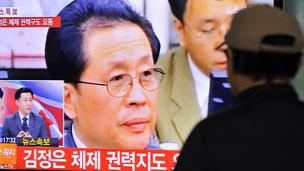North Korea's way with extreme insults
- Published

The uncle of North Korean leader Kim Jong-un, executed for treason on Thursday, has been officially denounced as "despicable human scum". Why is the language so over-the-top?
At a military trial, Chang Song-thaek admitted trying to overthrow the state, and was executed immediately, according to state news agency KCNA.
"Despicable human scum Jang, who was worse than a dog, perpetrated thrice-cursed acts of treachery in betrayal of such profound trust and warmest paternal love shown by the party and the leader for him," a said.
Strong stuff.
"The language has to be strong because this person was powerful and he has to be made to be the embodiment of all that is evil," says Professor James Grayson, Korea expert at the University of Sheffield. It's directed at a domestic audience, he suggests - whether it's rocket launchers or rhetoric towards the enemy, the strategy is a show of strength designed to coalesce the various factions of the North Korean authorities.
The full force of condemnation was denied to the foreign audience - domestic radio in North Korea referred to Chang Song-thaek as "nom", which is literally translated as "the bastard", but KCNA translated this as "he" for their English version.
Owen Miller of the School of Oriental and African Studies in London describes the language as a "a particular dialect of bureaucratese" beloved of the North Korean ruling class.
"They love these flowery Shakespearean insults - 'thrice-cursed traitor' and so on. It's not the kind of insult you hear on the street in South Korea, which is much more earthy - words referring to genitals for example - the kind of thing you might hear on a drunken Saturday night in London."
It is, however, in line with the sort of statements issued by Stalinist Russia and parts of Maoist China during leadership purges, says Grayson, after reading the full statement in Korean and in English.
Dogs often cropped up in the language of the Cold War. The Chinese frequently used the term "running dogs" to describe people they saw as subservient - as in the phrase "the imperialists and their running dogs, the Chinese reactionaries", used by Mao.
In 2012, KCNA captioned a gross cartoon of South Korean President Lee Myung-Bak in the following gruesome terms: "The dirty hairy body of rat-like Myung-bak is being stabbed with bayonets. One is right in his neck and the heart has already burst open. Blood is flowing out of its filthy bottom hole."
The phrase "despicable human scum", in the English alphabet, is pronounced roughly as "chuakhan ingan ssuraegi".
Follow on Twitter and on